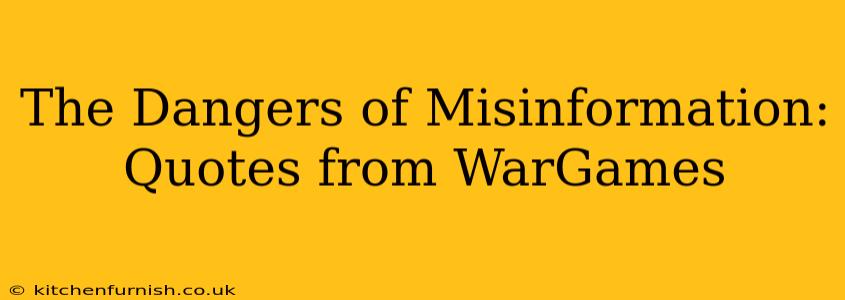The 1983 film WarGames, a classic of the Cold War era, explored the terrifying potential of a global conflict ignited by a computer malfunction. While the film's central plot revolves around a young hacker accidentally accessing and nearly launching a nuclear war, its enduring relevance lies in its exploration of misinformation and the catastrophic consequences of flawed information systems. Many of the film's quotes, though fictional, serve as chillingly prescient warnings about the dangers of misinformation in the digital age. Let's delve into some of the most impactful quotes and explore their contemporary meaning.
"Shall we play a game?" – The chilling invitation to conflict.
This iconic line, spoken by the supercomputer WOPR, encapsulates the insidious nature of misinformation. In the context of the film, the "game" represents a global nuclear conflict, triggered by a misinterpretation of data and a lack of human oversight. Today, this quote reflects the ease with which misinformation can escalate conflicts, both globally and on a personal level. The spread of false narratives and manipulated information through social media and other digital channels can readily ignite flames of discord, fueling polarization and hindering constructive dialogue. The seemingly innocuous "game" can quickly become a dangerous reality.
How can misinformation escalate conflicts in the digital age?
The rapid spread of misinformation online, often amplified by algorithms designed to maximize engagement, can create echo chambers where false narratives are reinforced and validated. This can lead to radicalization, mistrust in legitimate institutions, and even violent conflict. The lack of critical thinking and verification skills amongst users further exacerbates this problem. Without careful consideration and fact-checking, a "game" of misinformation can easily spiral out of control.
"A strange game. The only winning move is not to play." – The futility of engagement with disinformation.
This quote highlights the critical importance of avoiding engagement with known misinformation. The film suggests that attempting to "play" – to counter or engage with the false narratives – only perpetuates their spread and gives them undeserved legitimacy. Instead, the wisest course of action is often to ignore the disinformation and focus on promoting accurate information. This strategy, however, requires a sophisticated understanding of information ecosystems and the ability to identify and resist manipulation.
What are effective strategies for combating misinformation?
Effective strategies for combating misinformation require a multi-pronged approach. This includes promoting media literacy education, supporting fact-checking initiatives, and developing robust mechanisms for identifying and flagging false information online. Furthermore, fostering critical thinking skills and encouraging responsible information sharing are vital in mitigating the spread of disinformation.
The impact of faulty algorithms and systems: "It wasn't supposed to happen."
This statement underscores the inherent risks in relying solely on automated systems for making critical decisions. The WOPR's actions, while technically within its programming parameters, highlight the dangers of unintended consequences arising from poorly designed or incomplete algorithms. In today's world, algorithmic bias and the lack of human oversight in many technological systems create potential avenues for the propagation of misinformation and the spread of harmful content.
How can we mitigate the risks of algorithmic bias in the dissemination of information?
Mitigating the risks of algorithmic bias requires greater transparency and accountability in the development and deployment of algorithms used for information dissemination. Independent auditing, ethical guidelines, and robust human oversight are all crucial components of ensuring that technological systems are not inadvertently contributing to the spread of misinformation.
Conclusion:
WarGames, despite being a product of its time, offers enduring wisdom concerning the dangers of misinformation. Its powerful quotes serve as potent reminders of the need for critical thinking, media literacy, and responsible information stewardship in our increasingly interconnected digital world. By understanding the lessons embedded within this cinematic classic, we can better equip ourselves to navigate the complex information landscape and avoid the devastating consequences of engaging in the "game" of misinformation.

